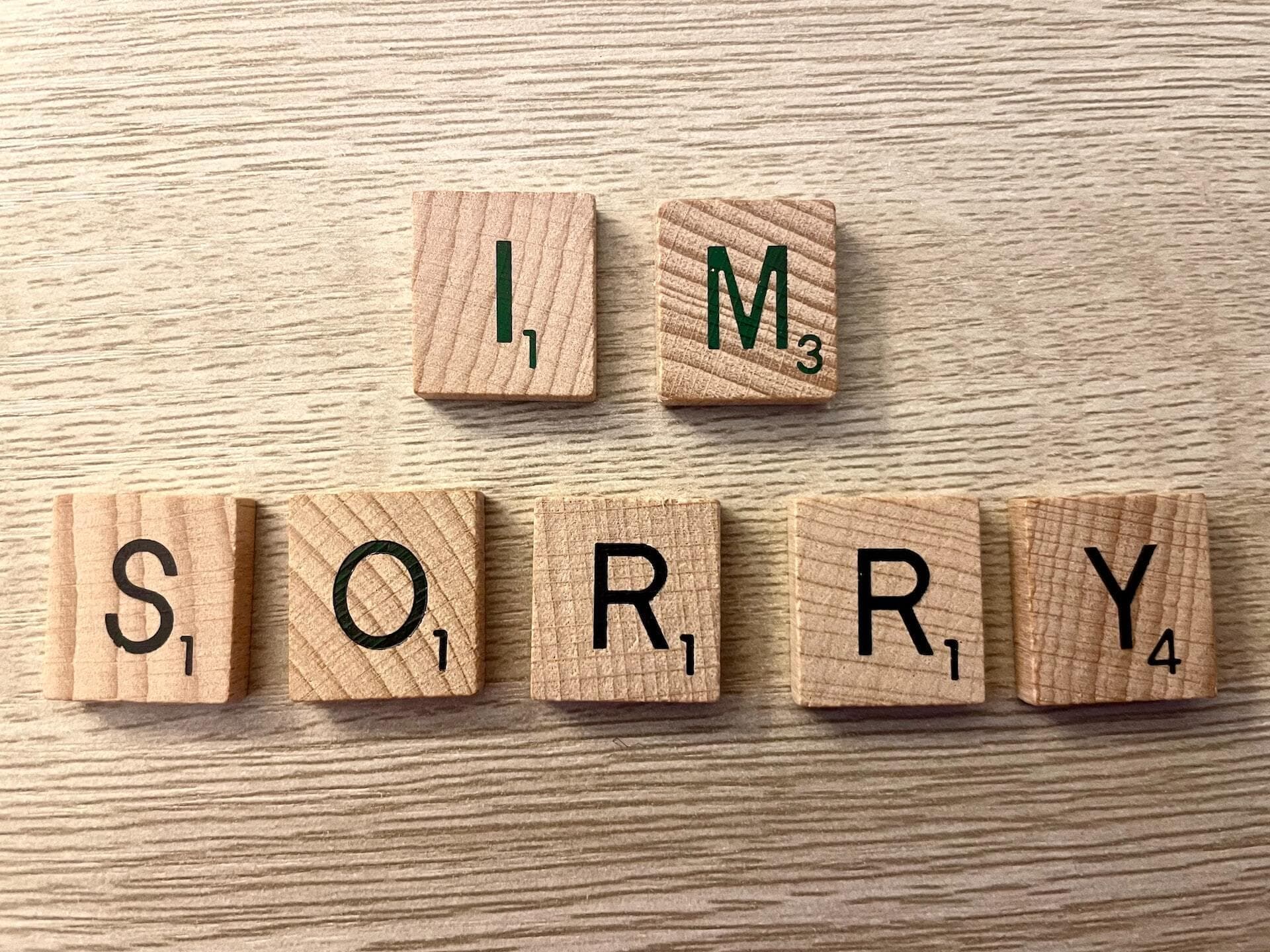In our everyday life, you may often find yourself in social situations where you need to say sorry - make an apology, express regrets, or even just be polite.
Just like in English and many other languages, there are several ways that are commonly used to say sorry in Mandarin Chinese depending on the situation.
对不起 (duì bù qǐ)

对不起 may be the most common and standard way to say sorry in Chinese. It directly translates to "sorry". It is often used as a phrase or complete sentence by itself.
For example, when you want to say, "I am sorry." In Chinese, this is simply " 对不起。"
If you want to add more information to this sentence, e.g., who is apologizing to whom, then you could say:
我对不起你。
I am sorry (to you).
Keep in mind that the above sentence sounds quite serious. You would generally say this when you're making a sincere and formal apology, and/or expressing deep regret.
对不起 applies to a wide range of situations, from making a formal apology for serious instances to expressing sorry for small mistakes, or even just to express "excuse me". Of course, whether your apology is accepted or whether you're forgiven depends on the person/people you're apologizing to.
To respond to "对不起", people generally use "没事" (méi shì) or "没关系" (méi guān xì), and both mean "it's ok/fine/alright".
A similar phrase to 对不起 is 对不住 (duì bù zhù), though you would typically add more parts to the phrase. Such as:
我对不住你 (I am sorry to you) - this is similar to the example above.
对不住了 (sorry)
However, 对不住 is less commonly used. It's almost always used formally (typically more serious than 对不起). For example, when you apologize to someone you hurt, or when you express your regret to someone.
不好意思 (bù hǎo yì si)

不好意思 is also a commonly used phrase. However, compared to 对不起, it's more casual.
It directly translates to "find it embarrassing to do something", but in reality, it's typically used to express sorry in a casual way.
When apologizing for small mistakes or expressing "excuse me" to be polite, it's better to use 不好意思 rather than 对不起, as the latter is more formal.
Here are some examples.
不好意思,请让一下。 - Excuse me, let me through, please.
不好意思,这里写错了。 - I'm sorry, there's a typo here.
不好意思打扰了。 - "Sorry to interrupt." Or "Sorry that I interrupted."
Of course, you can also use 不好意思 by itself as a sentence.
抱歉 (bào qiàn)

抱歉 is another common way to say sorry. Compared to the more casual ones directly above, it's typically used in a formal and polite manner.
You can use it when you feel bad about doing something when you want to express regret, or for a general apology.
It can replace 对不起, but there are some subtle differences.
When you're apologizing for something minor, like making a small mistake, using 抱歉 will make you sound more polite and formal compared to 对不起 or 不好意思 (whichever you would use otherwise).
For situations like apologizing for being late, they are interchangeable, and 不好意思 can also be used.
But when expressing sorry for something serious, 抱歉 may be a bad choice. It can make you sound insincere. Instead, 对不起 would be a better word to use.
原谅我 (yuán liàng wǒ)

This translates to "forgive me". You can use this phrase after you've given an apology (with one of those above), which will make you sound more sincere. Sometimes it can also replace 对不起/抱歉/不好意思 to express sorry.
Of course, you generally use it when you're trying to seek forgiveness.
There are situations where forgiveness is obvious or already given (e.g., apologizing for something small), then you don't need to use or add 原谅我.
There are also situations where you know you probably won't be forgiven, and I would advise you not to use it either - just give your sincere apology and embrace whatever consequences may come.
Here are examples of when you might want to use 原谅我:
原谅我,下次再陪你吃饭。
Forgive me, I'll eat with you next time.
For this sentence, you can also use 对不起/抱歉/不好意思 instead of 原谅我.
对不起,这是我的错。请原谅我!
I'm sorry, it's my fault. Please forgive me.
This is when you can add "forgive me" after an apology.
Note that instead of "请原谅我!", you can format your sentence differently, such as:
你能原谅我吗? - Can you (please) forgive me?
请你原谅我。 - Please forgive me.
原谅我,好吗? - Forgive me, please.
Acknowledging Your Mistake

Sometimes, following the word "sorry" - whichever one you choose from above, you might want to add acknowledgment of your mistake. To do so, there are a few phrases to choose from:
我错了 (wǒ cuò le)
是我的错 (shì wǒ de cuò)
是我不对 (shì wǒ bù duì)
……
These phrases all have the meaning of "it's my fault" or "I was wrong".
Some examples are given as follows.
对不起,我错了。 - Sorry, I was wrong/ I did wrong/it's my fault.
抱歉,这是我的错。 - Sorry, it's my fault.
对不起,这件事是我不对。 - Sorry, it's my fault.
There are many similar phrases to express the same meaning, and you can choose whichever works best for you. Here are just some suggestions that can be useful.
To say sorry in the Chinese language, there are many ways to do so, as well as different words and phrases to use.
Depending on the situation, from trying to be polite to apologizing for small mistakes, and expressing sincere regret, it's important to choose the appropriate way to say sorry.